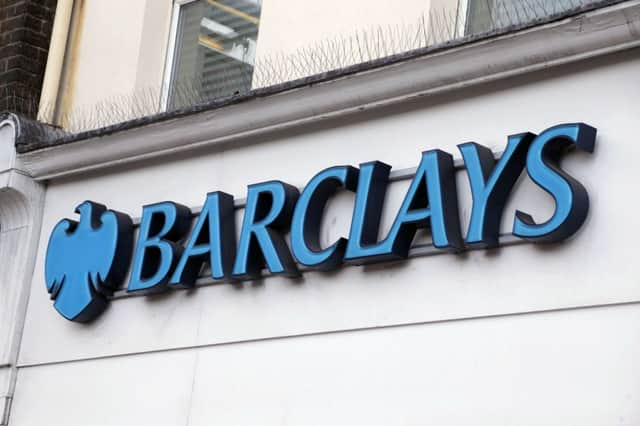Barclays: New Scots currency ‘likely’ post-Yes


An independent report produced by the bank examining the currency options after independence said the SNP’s favoured option of a formal currency union is “more challenging than commonly assumed”, making it probable that Scotland would create a separate currency.
The report does not represent the bank’s official view. Barclays said it has maintained a neutral stance on the referendum.
Advertisement
Hide AdAdvertisement
Hide AdBarclays’ currency analysts looked at four currency options for the report. The first option was the plan outlined by Alex Salmond for a formal currency union that would see Scotland share sterling and the Bank of England with the rest of the UK.
Also considered was an informal currency union – an economic arrangement known as “sterlingisation” – which would see Scotland use the pound but without any input into Bank of England policy.
The third option was joining the euro which, according to the report, posed “particularly large” uncertainties.
Establishing a separate Scottish currency was also looked at. This would require setting up new monetary institutions, including a Scottish central bank with independent lender of last resort responsibilities.
The report said that “an independent currency would provide the maximum degree of flexibility for policy”.
On the Scottish Government’s favoured option of a formal currency union, the report said the benefits would include reduced set-up and transaction costs.
However, it pointed out that Scotland and the rest of the UK would have to negotiate a clear set of fiscal rules between them – including a profit- and loss-sharing agreement for the Bank of England.
Assuming that a geographical share of North Sea oil revenues went north of the Border after independence, the paper said a sterling currency union would be “susceptible to asymmetric shocks” given the relative sizes of the Scottish and rest of UK economies.
Advertisement
Hide AdAdvertisement
Hide AdIt pointed out that Scotland had relatively larger financial and oil sectors.
“Without a well-designed fiscal transfer mechanism, these differences could make a monetary union unsustainable,” the report said.
On sterlingisation, the experts said that the lack of a lender of last resort would “precipitate financial shocks and capital flight in periods of stress”.
Yesterday, Scottish Secretary Alistair Carmichael claimed that the report underlined the benefits of remaining within the United Kingdom.
He said: “Once again, neutral experts have highlighted the difficulties that independence would bring for Scotland and the UK. This report confirms that Scotland and the UK are both better off with Scotland staying part of the UK.
“Leaving the UK causes us all sorts of currency problems and those problems would be amplified by falling oil revenues.
“As part of the UK, Scotland keeps the UK pound and keeps us working together with the rest of the UK, to create better opportunities and jobs.
“With nearly 100 days to go until the referendum, we are still in the ridiculous position of having to speculate as to what currency an independent Scotland would have.
Advertisement
Hide AdAdvertisement
Hide Ad“There is no good reason to trade-in the best of both worlds we have just now for a long list of problems that independence would bring.”
Scottish Conservative finance spokesman Gavin Brown said: “This analysis by Barclays suggests that an independent currency may be the most likely if separation happens.
“But the Scottish Government has done a pitiful amount on this issue so far. I understand that a paper the SNP is going to release this week will address this issue, and I look forward to reviewing that.
“This matter has to be faced up to by the Scottish Government, otherwise it will not be able to give people the information they need to make a decision in September’s referendum.”
A Scottish Government spokesman said: “Scotland has a strong economy and, as an independent country, we will be the 14th most prosperous nation per head in the OECD, ahead of the UK, Japan, Italy and France. As such, an independent Scotland will be a hugely attractive place to do business and to invest in.
“The pound is as much Scotland’s as it is the rest of the UK’s and a currency union, as this paper shows, is in the interests of the rest of the United Kingdom. In fact, this paper rightly points out the risks to sterling of not entering a currency union.
“The Scottish Government has put forward sensible proposals for a formal monetary union that would ensure both governments had full flexibility over their fiscal policies, within an overall sustainable framework.”
SEE ALSO